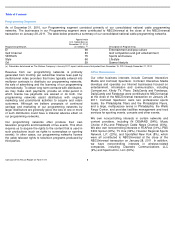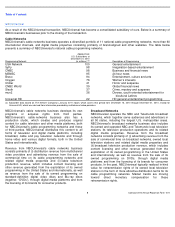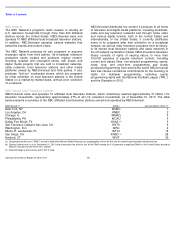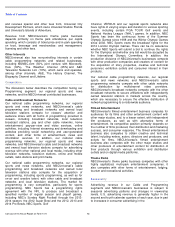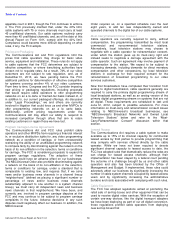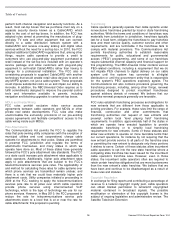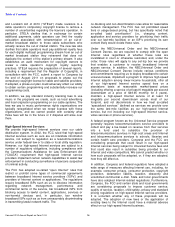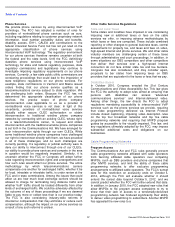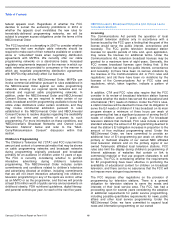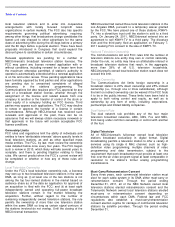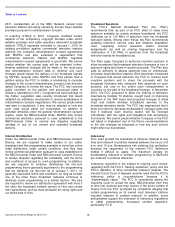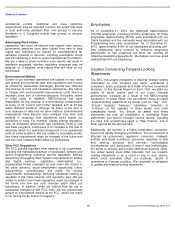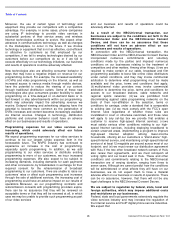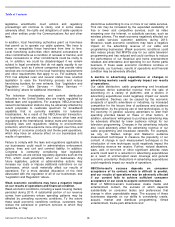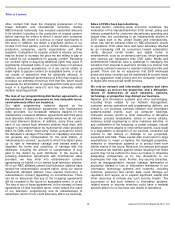Comcast 2010 Annual Report Download - page 22
Download and view the complete annual report
Please find page 22 of the 2010 Comcast annual report below. You can navigate through the pages in the report by either clicking on the pages listed below, or by using the keyword search tool below to find specific information within the annual report.
Table of Contents
Comcast 2010 Annual Report on Form 10-K
18
federal appeals court. Regardless of whether the FCC
decides to sunset the exclusivity prohibitions in 2012 or
whether the appeals court invalidates the new rules for
terrestrially-delivered programming networks, we will be
subject to program access obligations under the terms of the
NBCUniversal Order
The FCC launched a rulemaking in 2007 to consider whether
companies that own multiple cable networks should be
required to make each of their networks available on a stand-
alone or “unbundled” basis when negotiating distribution
agreements with MVPDs. We currently offer our cable
programming networks on a stand-alone basis. Increased
regulatory requirements imposed on the manner in which our
cable networks are provided to consumers or the manner in
which we negotiate programming distribution agreements
with MVPDs may adversely affect our business.
Under the terms of the NBCUniversal Order, MVPDs can
invoke commercial arbitration pursuant to rules established in
the NBCUniversal Order against our cable programming
networks, including our regional sports networks and our
national and regional cable programming networks. In
addition, under the NBCUniversal Order and NBCUniversal
Consent Decree, we are required to make certain of our
cable, broadcast and film programming available to bona fide
online video distributors under certain conditions, and they
may invoke commercial arbitration pursuant to rules
established in the NBCUniversal Order and NBCUniversal
Consent Decree to resolve disputes regarding the availability
of, and the terms and conditions of access to, such
programming. For more information on these conditions, see
“NBCUniversal’s Broadcast Networks and Owned Local
Television Stations” below and refer to the “Must-
Carry/Retransmission Consent” discussion within that
section.
Children’s Programming
The Children’s Television Act (“CTA”) and FCC rules limit the
amount and content of commercial matter that may be shown
on cable programming networks and broadcast networks
during programming originally produced and broadcast
primarily for an audience of children under 13 years of age.
The FCC is currently considering whether to prohibit
interactive advertising during children’s television
programming. The NBCUniversal Order includes certain
commitments and conditions related to children’s television
and advertising directed at children, including commitments
that we will not insert interactive advertising into children’s
television programming in any of the spots we control, either
as an MVPD or as the programmer, and that we will provide
at least $15 million worth of public service announcements on
childhood obesity, FDA nutritional guidelines, digital literacy,
and parental controls per year, for each of the next five years.
NBCUniversal
’
s Broadcast Networks and Owned Local
Television Stations
Licensing
The Communications Act permits the operation of local
broadcast television stations only in accordance with a
license issued by the FCC upon a finding that the grant of the
license would serve the public interest, convenience and
necessity. The FCC grants television broadcast station
licenses for specific periods of time and, upon application,
may renew the licenses for additional terms. Under the
Communications Act, television broadcast licenses may be
granted for a maximum term of eight years. Generally, the
FCC renews broadcast licenses upon finding that: (i) the
television station has served the public interest, convenience
and necessity; (ii) there have been no serious violations by
the licensee of the Communications Act or FCC rules and
regulations; and (iii) there have been no violations by the
licensee of the Communications Act or FCC rules and
regulations, which, taken together, indicate a pattern of
abuse.
In addition, CTA and FCC rules also require that the FCC
consider in its review of broadcast television station license
renewals whether the station has served the educational and
informational (“E/I”) needs of children. Under the FCC’s rules,
a station licensee will be deemed to have met its obligation to
serve the E/I needs of children if it has broadcast on its main
program stream a minimum of three hours per week of
programming that has a significant purpose of serving the E/I
needs of children under 17 years of age. For broadcast
television stations that multicast, FCC rules include a similar
standard whereby the amount of E/I programming deemed to
meet the station’s E/I obligation increases in proportion to the
amount of free multicast programming aired. Under the
NBCUniversal Order, we have committed to provide an
additional hour of E/I programming per week on either the
primary or multicast streams of our owned NBC affiliated
local television stations and on the primary signal of our
owned Telemundo affiliated local television stations. FCC
rules also limit the display during children’s programming of
Internet addresses of websites that contain or link to
commercial material or that use program characters to sell
products. The FCC is considering whether the requirements
for E/I programming have been effective in promoting the
availability of educational content for children on broadcast
television, and there can be no assurance that the FCC will
not impose more stringent requirements.
The FCC imposes other regulations on the provision of
programming by television stations. There is a general
obligation for television stations to serve the needs and
interests of their local service area. The FCC has had a
proceeding open for several years considering the adoption
of additional requirements for public service programming,
including possible quantitative requirements for news, public
affairs and other local service programming. Under the
NBCUniversal Order, we have committed to expand local
news and information programming on our owned


